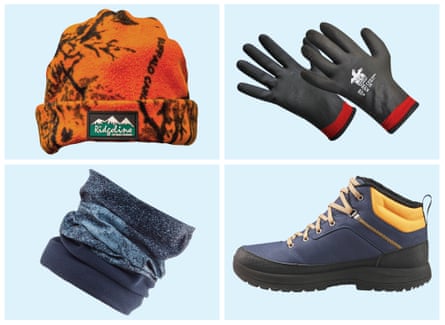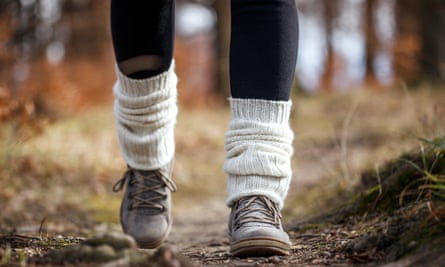Staying warm in winter
My mantra for staying warm in winter is simple, take care of your extremities – head, fingers, nose and toes – and follow the three layers of body clothing rule. Do that and you should be able to withstand the cold all day long. You don’t need to look like you’re going on manoeuvres (although surplus army kit is fit for purpose) and it needn’t cost you a fortune.
Head
In winter, cyclists wear thin skull caps under their helmets to cover their ears and protect them from the wind, but you don’t have to be a cyclist to wear a colourful beanie (£16). Over that, sport a Ridgeline solar fleece beanie, which is beyond cosy (£13.99).
 Clockwise from top left: Ridgeline fleece beanie, waterproof work gloves from Toolstation, waterproof Quechua boots and tubular buff, both from Decathlon
Clockwise from top left: Ridgeline fleece beanie, waterproof work gloves from Toolstation, waterproof Quechua boots and tubular buff, both from Decathlon
Fingers
Layers, layers, layers is the golden rule when it comes to winter clothing, and there’s no reason why that shouldn’t also apply to fingers, which can get painfully cold if you’re outdoors all day. Silk glove liners (£9.99) give an extra layer of protection. For outer gloves, take no chances and go thermal and waterproof. They can be pricey, so save money by getting a workwear pair from a hardware shop (£9.98). They work as well for adventurers as they do for builders.
And when things get really cold, reusable hand warmers (£4.99 for a pack of two), are not to be sniffed at. The mistake most people make is holding them in their palms, whereas they should be placed on top of the hand, where all the veins are. Put them between your hand and your liner to hold them in place.
Nose
There’s nothing worse than a dripping tap of a nose, but there’s an easy fix: a tubular buff (£5.99), worn bandit-style, will also keep your neck warm.
Toes
Cold spreads from the toes upwards, or so my mother told me, so it’s worth investing in a good pair of woollen socks such as Highlander Norwegian army socks (£10.95, ).Wool has a very high insulation-weight ratio and dries much faster than cotton.
You can spend a king’s ransom on boots, but there’s no need to. Make sure they are waterproof, have a good grip and are a comfortable fit (always buy in the shop rather than online). Warm and waterproof Quechua boots (£39.99) are tested down to -11C (static) and -20C (walking) for insulation and comfort.
Andy Pietrasik, head of Travel
Sweet charity
I’m planning for a trip to Iceland, so I’ve been looking for warm winter clothing. After a delivery driver lost my order from Black’s, I had the £60 refunded and spent much less on snow boots and base layers from Oxfam online. It has bargains that are delivered to your door by a real postie! Also, I found a new fleece snood for £1 in a charity shop.
Liz Searle
Profile
Readers’ tips: send a tip for a chance to win a £200 voucher for a Sawday’s stay
Show
Guardian Travel readers’ tips
Every week we ask our readers for recommendations from their travels. A selection of tips will be featured online and may appear in print. To enter the latest competition visit the readers’ tips homepage
–
Thank you for your feedback.
Multipurpose budget beanies
It gets cold here in Upper Canada, so you have to be prepared. Keeping warm on a budget is tricky, but when old man winter starts shaking the snow globe, a neat idea is to go to the nearest $ store (pound store in the UK) and buy a couple of the cheapest touques (woolly hats). Cut the top off one and use it as a neck warmer, stick another on your head and you are good to go.
Jimmy
Glove and care
As a cyclist I suffer from cold hands and feet on the bike, even with expensive kit. So, I use a pair of latex gloves inside my cycling gloves as extra insulation. It really works and since Covid these are widely available! Other cyclists I know swear by wrapping their feet in foil – it goes between sock and shoe.
Ellen Crabtree
Opposites attract
To save maximum money, shop online from firms in the opposite hemisphere to you. If you live in the northern hemisphere, shop in the southern hemisphere, and vice versa. Companies will be holding clearance sales at the time you will be moving into the season that is just ending for them. Result: fresh stock, bargain prices. You have to factor in shipping costs, currency conversion charges from your bank and local customs fees or taxes – but in my experience you’ll still end up quids in.
Dale
Profile
Readers’ tips: send a tip for a chance to win a £200 voucher for a Sawday’s stay
Show
Guardian Travel readers’ tips
Every week we ask our readers for recommendations from their travels. A selection of tips will be featured online and may appear in print. To enter the latest competition visit the readers’ tips homepage
–
Thank you for your feedback.
Pre-loved layering
I have poor circulation and have tried and tested many warming options. I swear by layering (with rollnecks going under anything) and have found that sites such as Depop, Vinted and eBay are full of affordable pre-loved cashmere and wool jumpers.
Sarah
Leg warmers at the double
 Photograph: Zbynek Pospisil/Alamy
Photograph: Zbynek Pospisil/Alamy
Leg warmers are an affordable option and I find it useful to take a couple of pairs on a winter break. You can wear them under trousers to keep warm then – discreetly – take them off if it warms up during the day. You can also use them as scarves and mittens, if you are on a skiing trip, without having to buy real ones for the piste. Another trick is to ask the hotel for an extra towel for your room – then put it in your jacket lining or under your coat as an excellent layer of protection.
Gonca
Carpet bagging
My father-in-law used to cut insoles from leftover carpet for his wellies … and it worked like a dream for keeping feet snug in the depths of a Scottish winter. If your feet are not ginormous, carpet samples would work well.
CE
Draughtproofed midriff
My Kidneykaren is a favourite. It’s a broad elastic band that goes around your waist and closes up the gap between your trousers/skirt and whatever you’re wearing on top. Instant warmth! They cost about £15.
Martina R Jones
Hardwearing workwear
Workwear from hardware stores, such as Screwfix and Toolstation. It’s hard-wearing and comfortable, and the waterproofing is usually excellent. Thermal building site gloves are also excellent for gardening in winter and far more dexterous than conventional gardening gloves.
Trevor Lawson
Winning tip: shawl solutions
 Photograph: Alamy
Photograph: Alamy
I’m the sort that’s always cold and so am a big believer in layers and keeping extremities warm. When vest, top, jumper, and coat aren’t enough, I wrap a large, thin shawl round my body like a bath towel under my coat to add warmth without bulk, and a second scarf/shawl for my neck and shoulders. I also endorse the two-hat rule: thin skull cap or hoodie, then thicker woolly or thermal one. I’d also put in a vote for making sure your feet are warm. Heat Holder thermal wellie socks are my secret weapon. I get a new pair once a year, definitely worth the investment – about £15.
Laura









